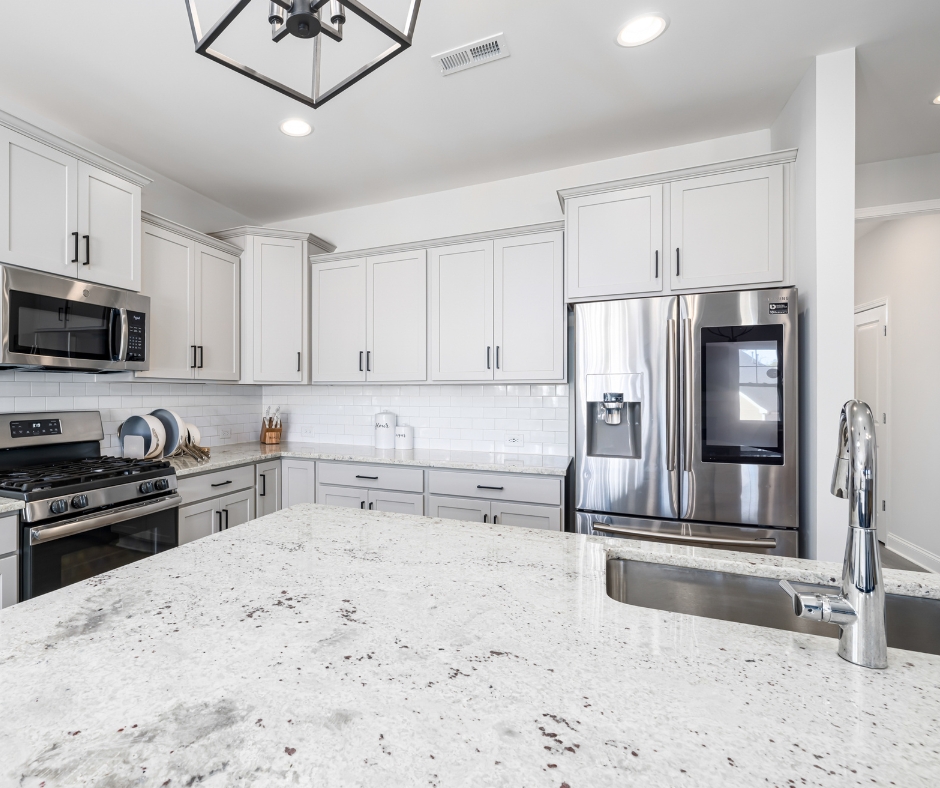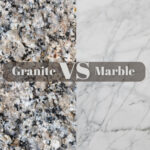Quick Answer: Clean granite countertops daily with mild dish soap and warm water using a microfiber cloth. Avoid acidic cleaners like vinegar, lemon juice, bleach, and ammonia. Clean spills immediately by blotting (not wiping), and reseal your granite every 1-3 years to maintain protection.
Granite countertops bring natural beauty and exceptional durability to any kitchen. These surfaces are tougher than marble, offer antibacterial properties, and can handle hot pans without damage. However, their unique structure requires specific care to maintain their elegance and protect your investment.
At Granite Prestige, we’ve helped thousands of homeowners enjoy beautiful granite countertops for decades. Learning proper granite cleaning techniques will keep your countertops gleaming for years while avoiding damage from harsh chemicals.
What NOT to Use on Granite Countertops
Understanding what damages granite is crucial for proper care. These common household cleaners can strip granite’s protective sealant and cause permanent damage:
Acidic Cleaners to Avoid:
- White vinegar or any vinegar-based cleaners
- Lemon juice or citrus-based products
- Products containing citric acid
Harsh Chemical Cleaners:
- Bleach and chlorine-based cleaners
- Ammonia-based products
- Glass cleaners (Windex, etc.)
Abrasive Tools:
- Steel wool or metal scrubbers
- Rough sponges or scouring pads
These substances can etch the granite surface and leave your countertops dull and vulnerable to staining.
How to Clean Granite Countertops Daily
Method 1: DIY Dish Soap Solution (Recommended)
This gentle approach works for everyday cleaning and is recommended by stone care experts.
Step-by-Step Process:
- Create the solution – Mix warm water with no more than half a tablespoon of mild dish soap
- Remove debris – Use a dry microfiber cloth to wipe away crumbs
- Clean the surface – Dip a clean microfiber cloth in the solution and wring until just damp
- Wipe in circular motions – Clean using small circular motions with light pressure
- Rinse thoroughly – Wipe down with clean water to remove all soap residue
- Dry completely – Buff dry with a clean microfiber cloth to prevent water spots
Method 2: Commercial Granite Cleaners
Choose cleaners specifically labeled for daily granite cleaning. Apply with a soft cloth, allow recommended contact time (usually 5 minutes), rinse thoroughly, and buff dry with a microfiber towel.
How to Remove Stains from Granite
Quick action prevents permanent staining. Here’s how to tackle specific stain types:
Water Stains and Mineral Deposits
- Wipe the stain in circular motions with a dry microfiber cloth
- Apply mild dish soap solution
- Continue wiping in circular motions
- Rinse with clean water and dry completely
Sticky Stains
- Dip a microfiber cloth in hot water
- Place the damp cloth over the stain and let sit for several minutes
- Wipe clean and dry thoroughly
Tough, Set-In Stains
- Mix baking soda with water to form a thick paste
- Apply paste to the stain and let sit for several minutes
- Gently work with soft cloth
- Wipe away paste completely and rinse with clean water
Organic Stains (Coffee, Juice, Wine)
For persistent organic stains, use 12% hydrogen peroxide applied with a soft cloth. Let sit briefly, then rinse thoroughly and dry.
When to Call Professionals: Deep-set stains from unknown sources or severe discoloration may require professional restoration. At Granite Prestige, our stone care specialists can assess and restore severely damaged granite to its original beauty.
Granite Stain Prevention Tips
Prevention is your best defense against granite stains:
Immediate Response:
- Clean spills as soon as they happen, especially acidic liquids
- Blot spills instead of wiping – this prevents spreading
- Use absorbent paper towels or clean cloths for blotting
Daily Protection:
- Use coasters under glasses to prevent water rings
- Place trivets under hot cookware
- Don’t store stain-causing items like oils directly on granite
- Wipe down surfaces after food preparation
How to Disinfect Granite Safely
- First clean the surface with dish soap solution
- Create a 50/50 mixture of water and isopropyl alcohol in a spray bottle
- Spray lightly across the granite surface
- Let sit for a few minutes
- Wipe dry with a clean microfiber cloth
This method effectively kills bacteria without damaging granite’s protective seal.
When and How to Seal Granite Countertops
Testing if Your Granite Needs Resealing
Water Drop Test: Place a few drops of water on the surface. If water disappears in 5 minutes or less, consider resealing. If water beads for 10+ minutes, sealing is still effective.
Sealing Schedule
- Light use areas: Every 2-3 years
- High-use kitchens: Every 1-2 years
- Heavy cooking households: Every 6-12 months
Sealing Process
- Clean countertops thoroughly and dry completely
- Wipe down with isopropyl alcohol to remove residue
- Apply granite sealer according to manufacturer’s directions
- Allow recommended setting time (usually 15-30 minutes)
- Wipe away excess sealer with a clean, dry cloth
- Allow full curing time before use (typically 24 hours)
Granite Maintenance Schedule
Daily: Wipe up spills immediately, clean with dish soap solution after food prep
Weekly: Deep clean entire surface, disinfect with alcohol solution
Monthly: Apply granite polish if desired, inspect sealing with water drop test
Annually: Assess sealing needs, consider professional inspection for heavily used surfaces. Granite Prestige offers professional sealing services to ensure optimal protection for your investment.
Frequently Asked Questions
Can you use Windex on granite countertops?
No, avoid Windex and glass cleaners on granite. These contain ammonia that can damage granite’s protective seal. Use granite-specific cleaners or mild dish soap solutions instead.
How often should granite be sealed?
Granite should be sealed every 1-3 years, depending on usage. Test with the water drop method to determine when sealing is needed.
What’s the best homemade granite cleaner?
The safest homemade cleaner is warm water mixed with a small amount of mild dish soap (no more than half a tablespoon per spray bottle).
How do you remove water spots from granite?
Remove water spots by wiping in circular motions with a dry microfiber cloth. For stubborn spots, apply mild dish soap solution, then wipe in circular motions and dry completely.
Is granite hard to maintain?
No, granite is easy to maintain with proper care. Daily cleaning takes just minutes, and the stone’s durability means it withstands normal kitchen use well with appropriate cleaners.
Can you put hot pans directly on granite?
While granite handles heat well, use trivets or hot pads. Extreme temperature changes can cause thermal shock and potential cracking.
What happens if you use vinegar on granite?
Vinegar’s acidity can etch granite surfaces and strip protective sealant. If vinegar contacts granite accidentally, rinse immediately with water and dry thoroughly.
How can you tell if granite needs resealing?
Use the water drop test: if water absorbs within 5 minutes, resealing is needed. If water beads up for 10+ minutes, the seal is effective.
Bottom Line: Granite countertops require simple, consistent care. Daily cleaning with mild dish soap, immediate spill cleanup, and periodic sealing will keep your granite beautiful for decades. Avoid acidic cleaners, use gentle techniques, and your investment will maintain its natural elegance while withstanding daily kitchen demands.
Ready to upgrade your kitchen with stunning granite countertops? Contact Granite Prestige today for expert installation and ongoing care support. Our team helps you select the perfect granite for your lifestyle and provides the knowledge you need to keep it looking spectacular for years to come.


